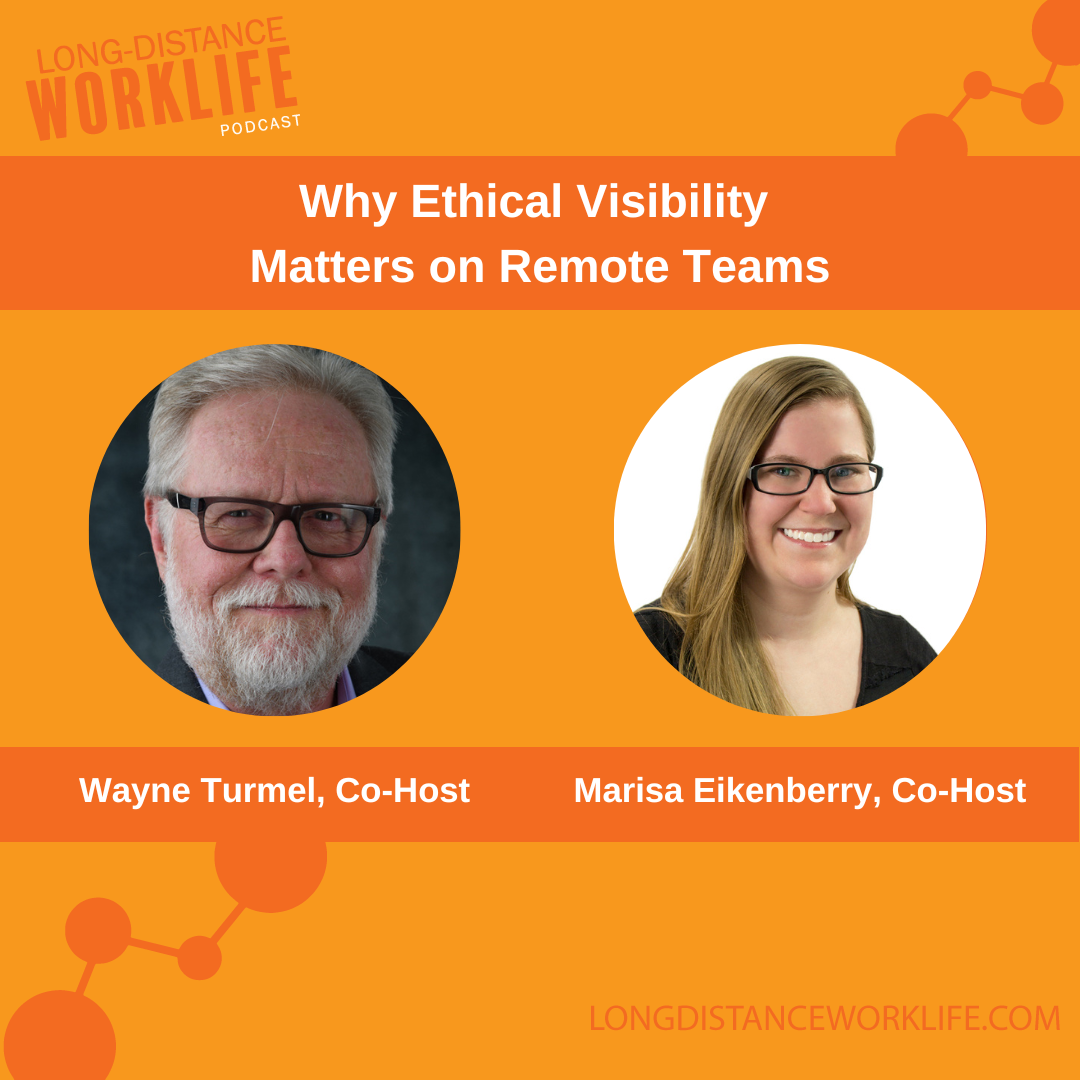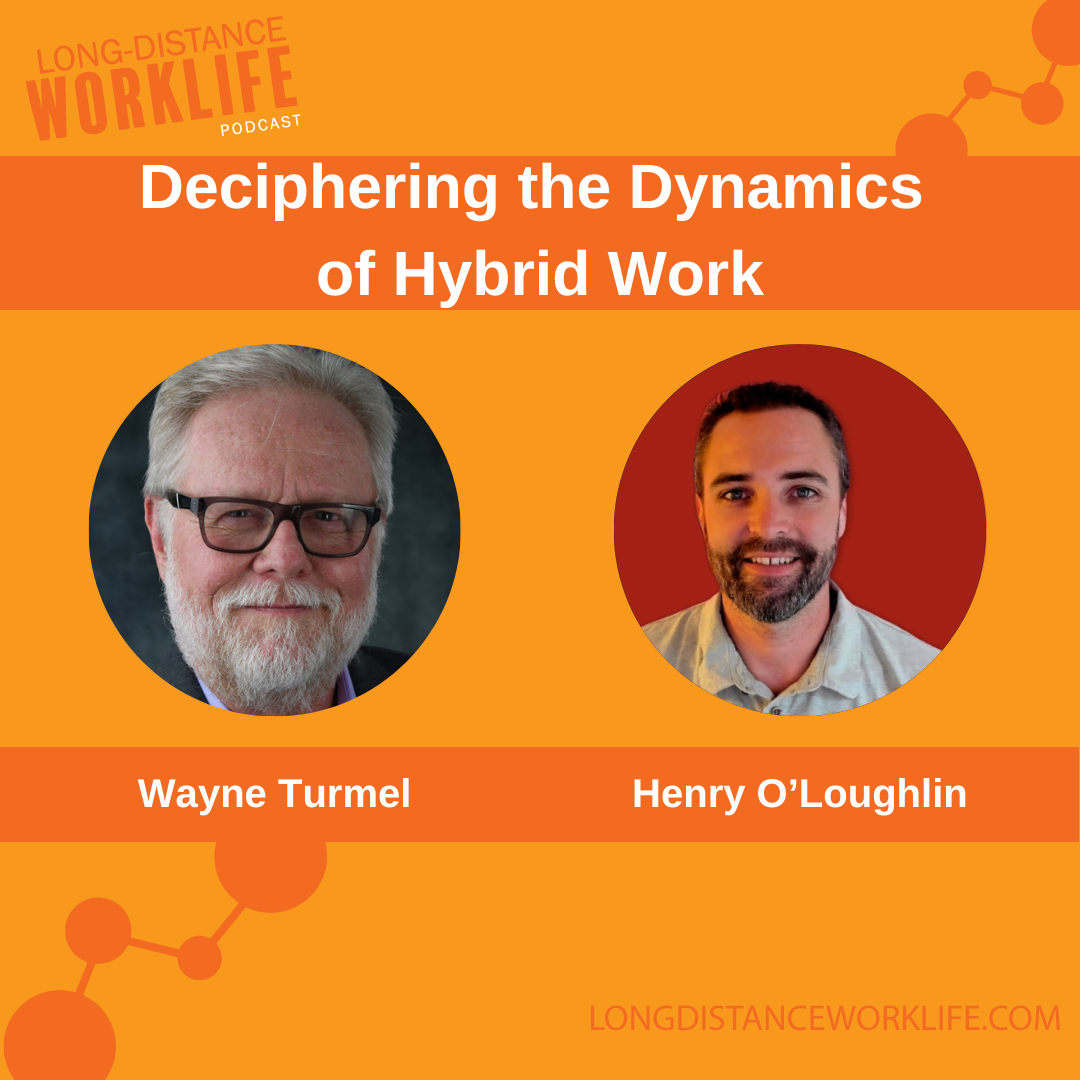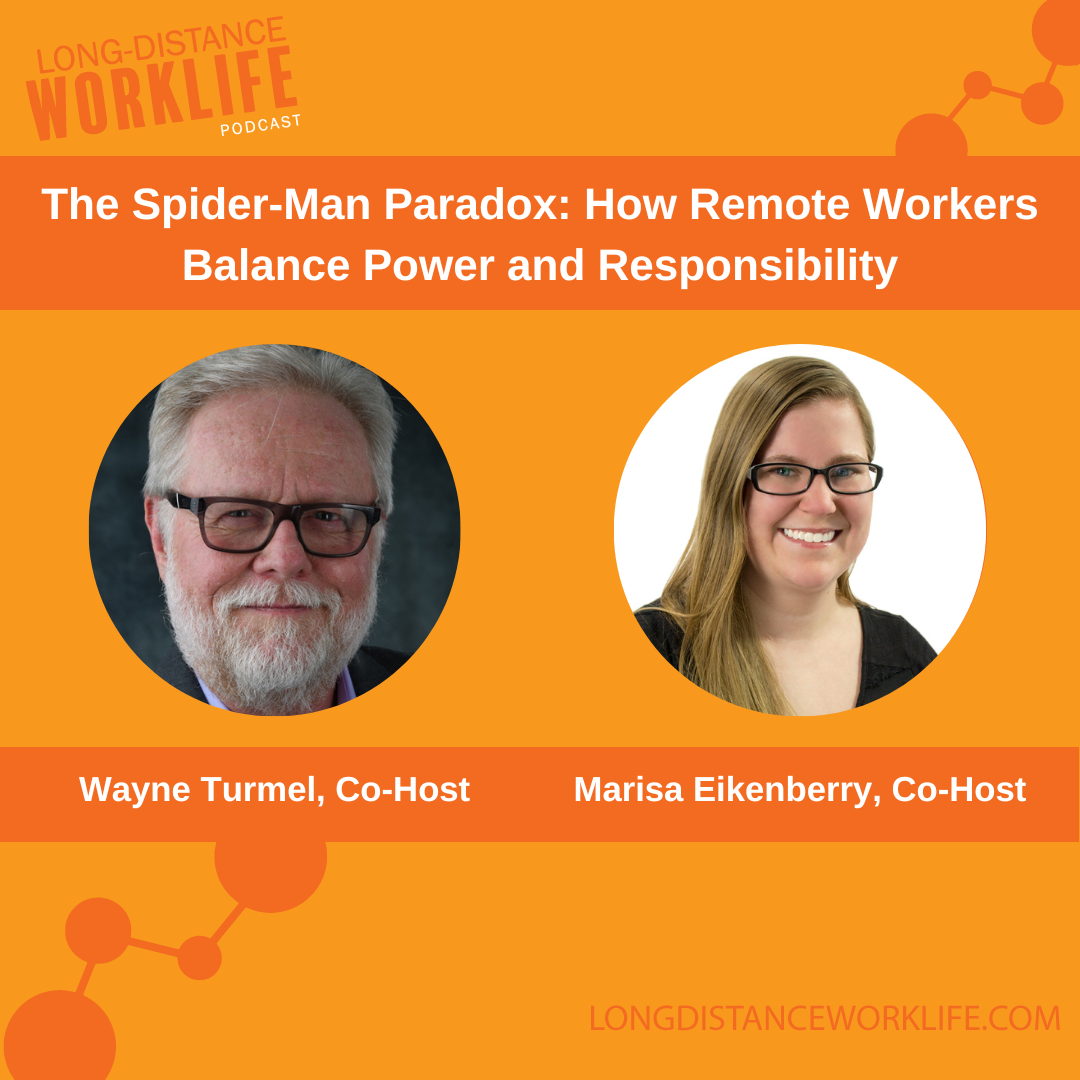Returning to the office is inducing some anxiety for people who haven't been back for the last couple of years, but what if you have never been to the office? Marisa joins Wayne to discuss what new workers might expect and how you can help them be successful when they're just starting out. (Or have only been remote before.)
Additional Resources
- What About New Workers Who Have Never Worked in an Office? (Blog Post)
- A Red Flag for New Grads About Work From Home (Blog Post)
- Onboarding New Hires in a Remote World (Blog Post)
- Learn more about Wayne Turmel
- Learn more about Marisa Eikenberry
- Purchase a copy of The Long-Distance Leader
- Purchase a copy of The Long-Distance Teammate
- The Kevin Eikenberry Group
Free Video Series!
Join us for a powerful, 4-part video series titled, Demystifying Remote Leadership. You will learn how to create solid working relationships in a virtual team with more confidence and less stress!
Transcript
Wayne: Hi, everybody. Once again, we are here with the Long-Distance Worklife podcast. My name is Wayne Turmel. With me is Marisa Eikenberry.
Marisa: Hi, everybody.
Wayne: People get very upset when Marisa isn't here, so we're very excited that she is. This is the podcast where we talk about how to work, lead and thrive in remote and hybrid teams. And there are a lot of questions about those things, and that's what this episode is about. This is one of our Marisa gets to ask Wayne anything questions.
And I kind of sort of know what we're going to talk about. But not much. So Marisa have at it, lady.
Marisa: Yeah. So I thought, especially in this whole idea of, you know, we've got return to office is a hot topic right now, just like, you know, and people are graduating and all that kind of thing. I mean, we're recording this in May. So I wanted to talk about what are the expectations of new workers now. You know, people who are just now entering into some of these remote teams or they've been around for a bit, now they've got to return to the office.
So I thought we could kind of touch on that a little bit, maybe like what they expect and what's professional and what's not, that kind of thing.
Wayne: Yeah, it's really interesting, actually. The last couple of years has created some havoc. And as we're returning to the office and and this is information coming to us from our clients you know, it was originally when people got sent home during the COVID Diaspora, we got- they said, well, it's just like working in the office except.
Marisa: And if you've never worked in the office...
Wayne: Well, that's the problem is over the last two years, we have brought in a whole group of people who maybe don't have that experience.
Marisa: Yeah. Or they've only done an internship. So it's not quite the same thing.
Wayne: Yeah, exactly. Right. And so, you know, you can't say, well, it's just like when you were in the office and they go, Yeah, OK.
Marisa: Exactly.
Wayne: And it's interesting because this often falls under the generational differences problem, right? And the grumpy old guys like me are like these darn kids don't know how to, you know, how things are done and they don't know how things are done in the office and and we're not wrong.
Marisa: But how can they know if they've never been there?
Wayne: Yeah.
Marisa: So I think we're not giving them enough grace either.
Wayne: When you're absolutely not giving them enough grace. That's that's a grumpy old man problem.
Marisa: Yeah. "OK, Boomer." Kind of deal.
Wayne: Going back to the dawn of time, right? But it's a real thing. And one of the ways of combating this that organizations are doing, which makes a lot of sense, is that they are allowing remote and flexible work based on how long you've been around. So when you are new to the organization, we're going to want to keep you close to the mothership.
We're going to want you to meet people. You're going to want you to see how things are done here. We're going to want you by mentoring and by just osmosis. It's amazing how much stuff we suck up out of the air around us that nobody ever says out loud. But if you work here, you just know.
Marisa: Yeah, you figure it out.
Wayne: We talk about culture a lot, and culture is a $10 word for it. This is how we do stuff here.
Marisa: Yes.
Wayne: The problem is that here the definition of here has taken a beating.
Marisa: Yeah.
Wayne: Do you mean this is how we do it in the office at 8021 Westover. Or do we mean this is how we do it as the Kevin Eikenberry group as an organization. And a lot of this hasn't been planned. I mean, leaders were thrown into the deep end. We're trying to make it work. We're hiring people.
You know, the people we're hiring know technology better than we do in some cases. So we assume that along with knowing how to use the technology, they know how to use the technology. And that's not necessarily true.
Marisa: Right. You've talked about this in previous episodes that. Yeah, just because you know how to how to technically use a program, email, whatever, doesn't mean that you know how to use it effectively in an organization or professionally.
Wayne: Exactly. Right. And so if we think about new people coming into the office and working from home, right?
Marisa: Yes.
Wayne: When somebody comes into the office for the first time, they often have to adjust. What is my working schedule like? It's a little bit unfair to take somebody who has never worked nine to five and let them send their own work schedule.
Marisa: Right. They don't really have anything to compare it to.
Wayne: You don't have anything to compare it to. You don't know what works real well and what doesn't. You don't know you're probably betting that more things can be done asynchronously than probably can fair. And that's assuming that you know what you're doing and you don't have the kind of panicky questions that newbies at any job are going to have, let alone people who are brand new to the workforce.
So I'm actually fairly sympathetic to organizations that say no, when you come to work for us, you're going to start in the office and then we're eventually going to take the reins off. And assuming your productivity is up and your professionalism is maintained and all of that stuff, we're going to then let you have more flexibility and get your life back.
But we want you fairly close at the beginning.
Marisa: Right? That absolutely makes sense there.
Wayne: I have a lot of sympathy for that. It does create an issue, though, when you are hiring people who are remote first. You know, as we start to the beautiful thing about being able to hire remote workers is that you are not bound by geography.
Marisa: Yes.
Wayne: Right. If the best available person is in Denver or Belize or whatever. Right. And more and more people are choosing to be digital nomads that's great. The thing is, what a lot of people are telling us is when we're hiring remote first we are not taking kids out of school.
Marisa: Right.
Wayne: We are refusing to hire anybody who hasn't already worked remotely for a couple of years.
Marisa: Yeah. So that way they kind of know what they're doing a little bit.
Wayne: And so we've created this black hole in the middle and it's you know, it's the time honored tradition. We only hire people with experience. Well, how do you get experience if you don't?
Marisa: Exactly.
Wayne: And this is a very big deal if you're talking about diversity and inclusion and hiring nontraditional people in your organization, yes. Whether those are people with physical disabilities, you know, people who culturally have not been part of your organization, and that's a very real thing.
Marisa: Yeah, I've seen a lot of people talk about that recently as far as inclusivity goes, especially with people who, you know, have some sort of physical disability or mental disability or something that working from home or working remotely is more inclusive to them, even though they're not in the office all the time. So you might think that's the other way around.
Wayne: Yeah. Theoretically, remote work should be more inclusive. The fact of the matter is, though, if you are concerned about cultural fit, if you are concerned that they need to have X amount of experience you are no longer going to people who aren't already in that job pool, which defeats the whole purpose.
Marisa: Right.
Wayne: So how do we then help these darn kids who don't know what it's like to work in an office? And we forget, for those of us that have done this our whole lives, that it is a completely unnatural experience. And we need to learn things like doors opened, doors closed, you know, when you just walk down the hall and bother somebody in accounting and when you go through chain of command.
Marisa: When do you pick up the phone versus the Slack message?
Wayne: Exactly right.
Those types of things which you often pick up kind of in the air or you start to do something. And old Bob, who's been there 20 years you know, gives you the hairy eyeball and you go, Oh, maybe I shouldn't do that, right?
Marisa: But you don't know any better.
Wayne: But so what happens in this is the point I think that we're trying to get to with this question is it's important that you work with your new employees to say These are the things that absolutely need to happen. How are we going to quickly involve you in the real work of the team and help you get to know people and get you comfortable to the point where it's OK to ask people questions and people will be proactive about mentoring you?
Marisa: Yes.
Wayne: And that kind of thing, I think and I know we've talked about this before, but I'm also not foolish enough to think that everybody slavishly listens to every one of these episodes.
Marisa: Fair.
Wayne: One of the things that we do at the Kevin Eikenberry group that to me is so natural and so many people don't is when somebody joins our organization, the first thing they do, their first job is to individually reach out to every member of the team and set up a half hour. Webcam conversation has to be a webcam conversation, and it has to be with every member of the team, regardless if you're going to work with that person or not.
Marisa: Absolutely. And well, and some of us who I know, I work in Indianapolis, so when I started, I was in Indianapolis. And so there are a few of those people. I actually did those conversations face to face. But we're also talking about pre-COVID times.
Wayne: Well, and you know, when you can do that, the problem with the face to face piece is that it usually happens much earlier than the rest of it. Yeah, I mean, think about what happens we have a team meeting. Everybody's in the building. We have a team. Hey, everybody, Marisa's joined the team. Everybody say hi to Marisa and everybody says, "Hi Marisa" and then they scatter and some are working in the office and some are working remotely.
And Marisa may never talk to the people who work remotely until they come back into the office.
Marisa: Right.
Wayne: How do we intentionally jump start those connections? How do we intentionally identify the people that Marisa is going to be comfortable going to? I can assign somebody as a mentor, right? Oh, Bob's been here a million years. We're going to make Bob her mentor.
Marisa: But if we don't click, that could be a problem.
Wayne: But you don't click, you know, for whatever reason, right? Right. And it doesn't have to be anything traumatic, really, does it? You just don't.
Marisa: We just might have different communication styles.
Wayne: Exactly. Right. So, you know, makes sure that the more people you're interacting with as richly as possible and then identify who are the people. You know, one of the things that managers don't do is debrief those conversations. So what did you learn? And you're going, what is Wayne's problem? That's where I or you know, I really like Angie.
What's her story? And that helps me as the manager to think, aha, maybe we need to foster this relationship, which I wouldn't normally think of.
Marisa: Yeah. Because clearly those people click. Yeah, absolutely.
Wayne: And also talk to the people who, you know, she seems really but she doesn't have a lot of experience in this or she was asking a lot of questions about a certain topic that should tell me a ha. We need to bolster her experience and her training in that particular area. It's really interesting when people join the workforce, they come in at all kinds of different places some have.
I was lucky my mother was a secretary back in the days when there were secretaries and she taught me what it is to work in an office. Even though I'd never worked in an office, I knew how to take a phone message.
Marisa: Right.
Wayne: Right. Even at home. We answered the phone. Wayne Turmel speaking, Who do you wish to speak to.
Marisa: So you were ready.
Wayne: And you knew when you take a phone message, this is what I knew, that when I got into the office, I was like, OK, I'm going to take a phone message.
Marisa: Yeah.
Wayne: If you if that wasn't part of the air you breathed.
Marisa: Then you'd be at a disadvantage for sure.
Wayne: Be at a disadvantage. And then people think you're an idiot, which is not fair, right? You can't you know, you can't say a bear is smarter than a fish because a fish can't climb a tree.
Marisa: Right. Kind of in a similar fashion. You know, in your case, like you learn how to work in offices beforehand, like I watched my mom work in nontraditional environments and small businesses my entire life. And so for me, you know, thankfully, I started working in an organization that technically is a little bit nontraditional. I went to the office.
The office is a house. Nobody lives there, but it's a house, you know, and so some of those little cultural things, but not corporate things I was already used to anyway. It's a different thought process. It's on the opposite spectrum, but it is kind of similar in a way.
Wayne: So I think to, you know, make this practical for people because they're not that fascinated with our childhood furniture. Although why? Why not? I say I think if we're going to make this practical for people, a couple of things. One is find out what is what experience do people have working in the kind of environment that you work in.
Ask them what their concerns are yes. You know, during the interview process, having the interview process may not be the right time necessarily. Simply because people tend, oh, I have no flaws, you know, what's.
Marisa: Maybe onboarding.
Wayne: What's your biggest flaw? I care too much. Oh.
Marisa: I'm a perfectionist.
Wayne: Yeah, you know, it's not. But we've been trained to answer these questions. But as part of the intake process, you don't take the time to ask people what has been their experience with. And this is where experience based interviewing is so important it's not just your attitude, it's what have you done? Or in this particular, you know, if you're working on something and you realize that there's a problem, who's your first call?
Gotcha. Right? Those types of things will help set this up. And if you're in h.R. Or learning and development, these are the kinds of trainings that people are going to need and they don't some of it should be done in a class environment, whether that's a virtual or an in-person, because the social learning component is so important and there's so much to be said for learning in cohorts for working across the organization and building relationships and all of that stuff.
But really, as we're bringing in people who don't have that workplace environment, listen for where there are gaps in the knowledge.
Marisa: And maybe also kind of think about what those could be. And, you know, as an example, you know, I've been working for this organization now for eight years but when I hit right around year five, year six, it never occurred to me that I should have been talking to my manager about, Hey, I've been working here for five years now.
Like, you know, do people get more days, more days off at this point, or are there other negotiations that need to happen? That would have never occurred to me because this is my first job. And I had another coworker who had talked to me later and she was like, oh, my gosh, I didn't even think about the fact you wouldn't have even known to ask this.
You know, here's what you need to do next time or something like that. So, I mean, even if they're not, quote unquote, new, you may want to consider those things as well.
Wayne: Well, one of the things that we do and we're near the end of our time is when we set up mentors. We assume that people are only going to need those mentors for the first month month and a half.
Marisa: And even after.
Wayne: And then the mentor gets.
Marisa: Don't know.
Wayne: The mentor gets sprung to go back to work and not have to worry about, you know.
Marisa: Mentor somebody else.
Wayne: And suddenly you're expected to fly instead of doing what I should do is make you somebody else's problem.
Marisa: Yes.
Wayne: Because the mentoring and the learning and the things that we need for our careers and such are ongoing forever. So that's probably if again, if you're taking stuff away and looking in our show notes and you should jolly well be looking on our show notes at longdistanceworklife.com, that's the thing is how long does your mentoring go on?
And, you know, at different stages of people's onboarding and career, do we need to reexamine who does that for that?
Marisa: Absolutely. Yeah, it needs to be an ongoing conversation.
Wayne: Speaking of longdistanceworklife.com, that's where you will find the show notes for this show. You'll also find on that page at the bottom a place to ask questions. And Marisa is actually doing a great job of scanning these every week and picking out the questions that might become one of these ask, me anything kind of interviews so in the meantime, please, like and subscribe.
If you have not yet read The Long-Distance Letter and The Long Distance-Teammate, that's probably a really good place to start. You can buy those Amazon or wherever fine books are sold. You can also reach out to me Wayne@KevinEikenberry.com or Marisa@KevinEikenberry.com. That is this week's episode of The Long-Distance Worklife.
Marisa Anything you want to say before we release people into the wild?
Marisa: I do also want to say that we also have a free video series called Demystifying Demystifying Remote Work, correct?
Wayne: Yes. Yes.
Marisa: It's a four video series. Sorry, I forgot the name for half a second. It's a four video series. It's totally free. We'll also have a link for that in the show notes too, to help you guys continue to live and thrive in a remote and hybrid team.
Wayne: There you go. Thanks, everybody. We'll see you next episode.




